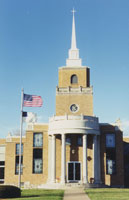formerly Blue Ridge Baptist Church and Grandview Baptist Church
on Grandview Road adjoining the Soloman Young farm prior to 1891; on the southwest corner of Grandview Road and Main Street from 1891 to about 1949 (in two different church buildings); at 1416 Main Street since 1949 (pictured here).
The First Baptist Church of Grandview (named the Blue Ridge Baptist Church from 1867 to 1913, and the Grandview Baptist Church from 1913 to 1963), was prior to 1891 located on two sites adjoining the Solomon Young Farm, essentially in the front yard of the farmhouse. Both sites were donated by Solomon Young. The church has been in three buildings at two locations in Grandview since 1891, two buildings on the southwest corner of Grandview Road (1891 to 1906, and 1907 to 1949), and at 1416 Main Street in Grandview since 1949.
Truman became a member of the First Baptist Church of Grandview, then called the Grandview Baptist Church, in September 1916. He had been baptized into the Benton Boulevard Baptist Church, which was near where he was living at the time, in about 1902, when he was 18 years old. He described himself in 1911 as a "lightfoot Baptist." The Baptists, he said, "do not want a person to go to shows or dance or do anything for a good time. Well I like to do all those things and play cards besides. So you see I am not very strong as a Baptist. Anyhow I don't think any church on earth will take you to heaven if you're not real anyway. I believe in people living what they believe and talking afterwards…." (Letter to Bess Wallace, March 19, 1911. Papers Relating to Family, Business, and Personal Affairs.) Thirty five years later, Truman was still a Baptist. "I'm a Baptist," he wrote, "because I think that sect gives the common man the shortest and most direct approach to God." (Handwritten autobiographical manuscript, 1945. President's Secretary's Files.)
Truman's mother and father probably first met at the Blue Ridge Baptist Church when it was located in the front yard of the Young farmhouse. Truman's mother had left the congregation sometime before the family moved to Independence in 1890 because, as Truman later wrote, "she felt that there were too many liars and hypocrites in it."
During his years as farmer, Truman helped dig graves in the church cemetery, which was in the front yard of the Young-Truman farmhouse. He described a grave digging experience in January 1911 in a letter to Bess Wallace. "It is not nearly such a sad proceeding as you'd think," he wrote. "There were six or seven of us, and we'd take turns at digging. Those who weren't digging would sit around and tell the one who was how it ought to be done and tell lies about the holes they'd dug and the hogs they'd raised." Once very late at night, when he was returning home from a visit to Bess Wallace in Independence, Truman turned into the cemetery gate instead of that for the farmhouse. "…I was not fussed over that…," Truman wrote reassuringly. "It would have been an ideal night for some old antebellum ghost to rise up and turn my hair gray but it never appeared. That cemetery is the best behaved I ever heard tell of. I have been passing it at midnight and 1:00 a.m. since 1906 and never have I seen even so much as one piece of sod turn over or one gravestone behave other than it should."
On March 29, 1949, the pastor of the Grandview Baptist Church, Welburn Bowman, met with President Truman at the White House. Truman had invited him to Washington to discuss plans to rebuild the church. Bowman said the congregation wanted to move to a new, larger site, but that they couldn't afford to move, and that they had decided to build a new church on the old site. Truman told Bowman that he wanted to make a contribution to the building fund. "…He said he would give us a substantial amount," Bowman remembered. "He didn't commit himself as far as dollars and cents were concerned--but he did say, 'I'll give you a substantial gift….' He sent two checks as I recall. I'd say that two or three weeks after [I met with him in Washington,] we got the first check for $10,000. Then, perhaps in another month, or six weeks, we got another check for $10,000." As a result of this contribution, much or all of which Truman in fact raised from some of his friends, the congregation changed their mind and decided to build their new church on the larger site they wanted. (Welburn Bowman oral history interview, Truman Library, 1981.)
At the dedication services for the new church, held on December 24, 1950, Truman said he hoped to erect a shrine to the Grandview Masonic Lodge on the site of the old church. "I don't want to see a tavern or anything of the sort go on this corner where that church has been," he said, "and if I can prevent it, it is not going there." Truman subsequently bought the old church building and sold it to another church. Several years later the old church building was torn down and a gas station was put in its place.
After Truman became Senator and then President, he seldom attended services at the Grandview Baptist Church. "…I have found that I cannot appear regularly in church, either in Grandview or Independence," Truman wrote in about 1960, "without feeling like a showpiece or someone on exhibit. So I do not go as often as I would want to." (Mr. Citizen, p. 127.)
